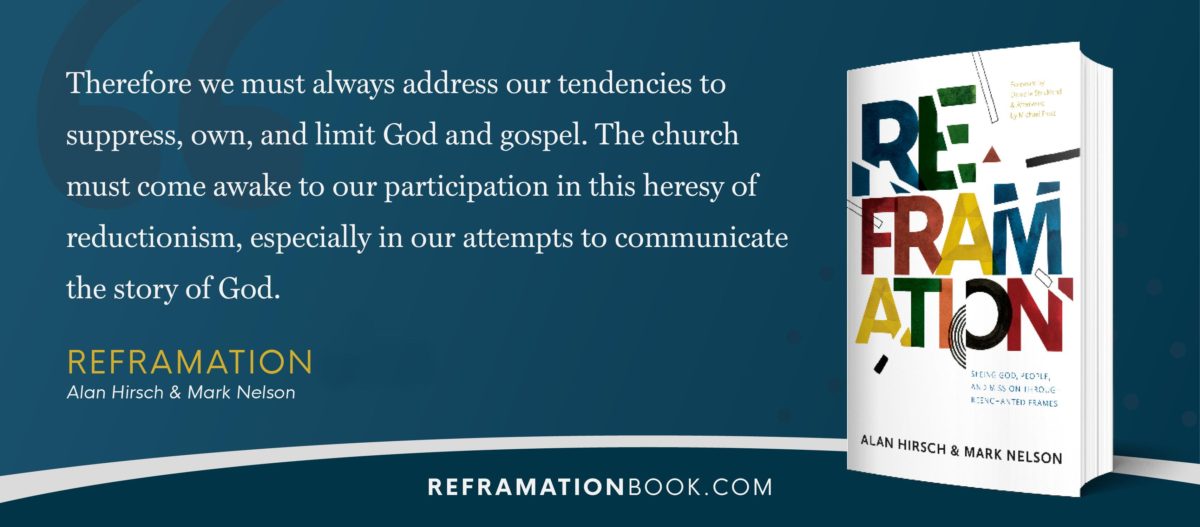Not surprisingly, an exploration of archetypes in human society is similar to the idea that myths are foundational to both personal and group identity. Joseph Campbell has aptly demonstrated the ongoing power of primary myths (defining narratives) throughout human history. For my purposes, I just want to highlight a particular aspect of myth and relate it to the role of …
REFRAMATION: The Great Reduction
Today, we have an exclusive look at Reframation: Seeing God, People and Mission Through Re-enchanted Frames, the new book by Alan Hirsch and Mark Nelson. This work…whoa! This new book takes a fresh, careful, studied and inspired at the Gospel. In the reading that follows, straight from Chapter One: Moving The Moon, you are going to find a word about …
When the Hand Doesn’t Understand the Purpose of the Foot
Recently I have had the opportunity of attending several of our denomination’s annual gatherings and immediately I recognize what our denominational leaders have long understood about our very congregational structure– there is not one Conference like another. The culture, the ambiance, the spirit of the people assembled in each conference is distinct and… beautiful. Each conference is an expression of …
5Q In The Classroom
This year, I’ve upped my involvement in my kids’ schools. Lots of meetings, boards, PTAs and O’s, rehearsals, performances, car pools and class time. As a church planter, I think it’s been the best way to get grounded in the neighborhood and keep a finger on the pulse, not only of what is going on, but who people really are, what they are struggling through and what excites them.
It’s also presented a new paradigm for 5Q. Perhaps the best word for it is praxis. I’ve seen 5Q at work in new and inspiring ways through the students, especially the elementary kids. They haven’t fully developed the filters that keeps them from being 100% who they are. It’s so awesome to watch unhindered personalities at work and play.
5Q Like Jazz
Over my thirty years in ministry, the mention of APEST in the book of Ephesians has inspired so many thoughts and ideas. Putting these ideas into practice has built a lifetime of experience seeing these gifts bring renewed life into the expression of the Church. I came from a background where I was taught that the five-fold gifts are given …
5Q and a Missional Renaissance
Our culture is moving at the speed of busy. It’s like 5th gear, but extra: 6th gear. I can just hear our calendars expanding to fit the larger transmission (OK, no more mechanic metaphors). In most cases, 5Q is a new paradigm that we are trying to teach and in order to help the people in our spheres of leadership learn something new, we have get realistic about the challenges of the typical theological education paradigm or discover something new, a new strategy.
5QCAST: GO SLOW TO GO FAST W/ JESSIE CRUICKSHANK
Podcast: Play in new window | Download
Subscribe: RSS
In today’s podcast with Jessie Cruickshank, you will be lead through some of our times’ greatest classic theological training like: Which animated film has the best philosophy for life? What does it mean to “Go Slow to Go smart, go smart to go fast”? How do you let your passion burn and not scorch everyone around you? How do apostles …
A Biblical Approach to Incarnational Evangelism, Part 3
“Don’t you know that those who work in the temple get their food from the temple, and those who serve at the altar share in what is offered on the altar? In the same way, the Lord has commanded that those who preach the gospel should receive their living from the gospel” (1 Cor. 9:13–14). So wrote Paul, though he was quick to point out that he was not feathering his own nest. He told the Corinthians that he personally was not after any remuneration, only that the church should financially support the work of evangelists generally.
A Biblical Approach to Incarnational Evangelism, Part 2
This is the third primary commitment of a missional-incarnational church’s infiltration of society. If the church is living an intriguing new lifestyle that is so marked by goodness that it makes the gospel attractive, then to truly be effective it follows that this lifestyle must be lived in close proximity to not-yet-Christians. Paul took this seriously in his mediation of the Corinthian factions that had split over the issue of eating food offered to idols (1 Cor. 10:27–11:1).
A Biblical Approach to Incarnational Evangelism
If the Christian church is to be incarnational and missional, as we believe the New Testament anticipates, and if it’s to abandon an us-and-them mentality, it will need to rediscover the biblical mode of impacting the world around it. The traditional-attractional church thinks about evangelism as sending out church members to share their faith with others and to bring them into the church. But the New Testament writers saw it much more organically.












